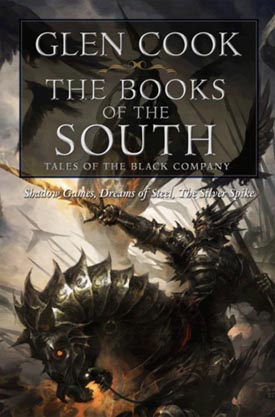 Glen Cooks’ Annals of the Black Company ranks as one of the most significant (and most popular) fantasy series since Tolkien’s Lord of the Rings. While I won’t go so far as to agree with Steven Erikson that Cook “singlehandedly changed the face of fantasy,” I will say that he brought to the forefront that strand that begins with Fritz Leiber’s stories of Fafhrd and the Grey Mouser and continues through Michael Moorcock’s great cycle of the Eternal Champion (and that at this point culminates in Erikson’s own The Malazan Book of the Fallen).
Glen Cooks’ Annals of the Black Company ranks as one of the most significant (and most popular) fantasy series since Tolkien’s Lord of the Rings. While I won’t go so far as to agree with Steven Erikson that Cook “singlehandedly changed the face of fantasy,” I will say that he brought to the forefront that strand that begins with Fritz Leiber’s stories of Fafhrd and the Grey Mouser and continues through Michael Moorcock’s great cycle of the Eternal Champion (and that at this point culminates in Erikson’s own The Malazan Book of the Fallen).
The Books of the South contains three novels that mark a transition in the Annals: at the beginning of Shadow Games, the Black Company is, for all practical purposes, no more. It consists of seven members, and as a fighting force, it’s a joke. But then, the Company has never been about fighting, but about winning. The thread that joins Shadow Games and Dreams of Steel is the quest to return the Annals to fabled Khatovar, far in the south, the original home of the Free Companies, of which the Black Company is the last. And so the Company, in the company of the Lady, bereft of her powers after the defeat of the Dominator, turns toward her fortress at Charm to retrieve the abandoned volumes.
The way to Khatovar runs through Taglios, an ancient city now threatened by the growing power of the Shadowlords, whose lands lie even farther south. And somehow, everyone knows the Black Company is coming, although the reaction, composed mostly of dread and loathing, poses a mystery that Croaker can’t solve. The icing on the cake, so to speak, is that in Taglios, although everyone remembers the Black Company’s arrival four hundred years before, no one can seem to produce a history of the period. That doesn’t stop the rulers of the city from scheming to use the Black Company to defeat the Shadowlords.
The first two books in this omnibus reinforce Cook’s contention that the protagonist of the story is the Company, and not any individual character. Circumstances force Lady to take up the Annals in Dreams of Steel (although as we learn later, her journals have been edited by Murgen, who became Annalist after Lady). From the standpoint of the reader, we see a distinct shift in tone and diction, as the Annals are now reflected through Lady’s personality. The story is marked by Cook’s blend of deception, hard-nosed politics, “creeping realism,” sneaky battle tactics, and the operations of blind chance.
The Silver Spike is something of an anomaly in the Annals, and I’m not sure I’m completely satisfied with its placement here. It’s a coda to the first trilogy in all necessary respects, following the course of the members who have left the Company, Silent, Darling, and Raven, and detailing the ultimate fates of the Dominator (or what is left of him), the Limper, Toadkiller Dog, and Raven. The Son of the Tree, into which the silver spike that holds the Dominator’s soul, if he can be said to have had one, has been driven, is distracted by a bonfire and the spike is stolen. The thieves make their way home to Oar and there the drama plays out, as word of the theft and the location of the spike spreads. Cook takes full advantage of the opportunity to examine humanity at its best and worst here, and the book is certainly strong enough to carry itself, if you can set aside your expectations of what a Black Company novel should be, but all I can say is that in terms of the chronology of the series, it belongs in here somewhere, and I suppose last in this volume is as good as first: Raven covers much of the same geography that Croaker and his band do, since he is trying to catch them, and the events in this book and the other two are roughly contemporaneous. My only hesitancy here is simply that I have always thought of The Silver Spike as fourth in the series, and it does make sense in that place as much as a finish to The Books of the South. And, all else being equal, you can read it in any order you want.
So, we have the next and very welcome installment in the Annals of the Black Company, a classic of contemporary fantasy. There’s not really much to argue with there.
The saga continues in The Return of the Black Company.
(Tor Books, 2008)
